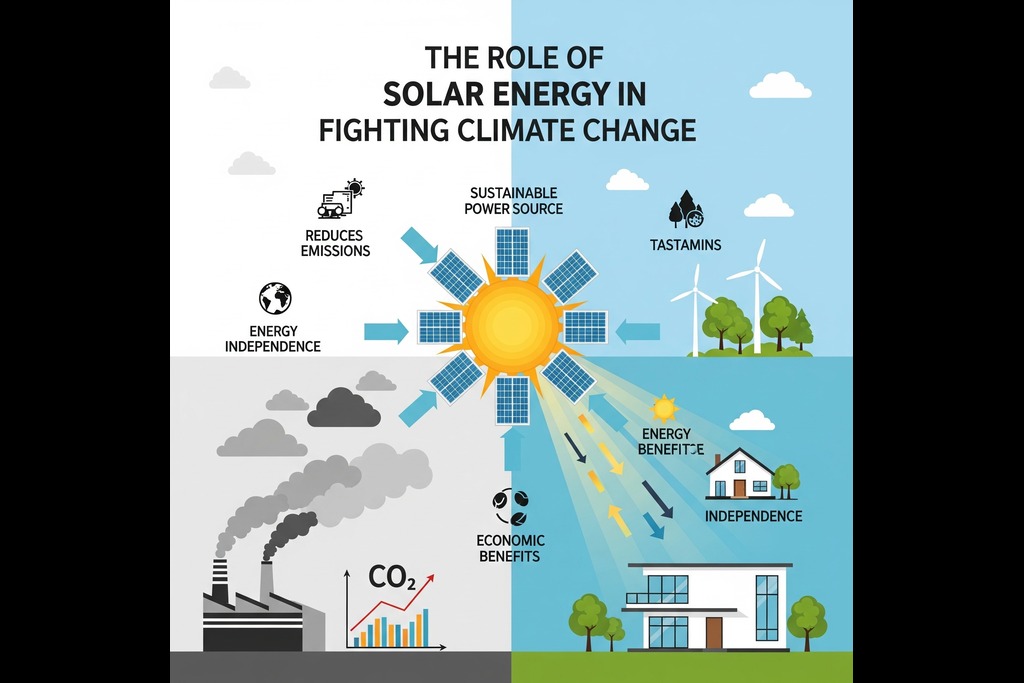The Role of Solar Energy in Combating Climate Change
Climate change is likely to be the largest danger threatening our world at present. Rising global temperatures, torrential weather conditions, and melting ice caps all indicate the need to encourage sustainable means of reducing greenhouse gas emissions and maintaining our environment. Among all the renewable energy materials available, solar energy stands out as a prime source of combating climate change. Utilizing the energy of the sun not only reduces the use of fossil fuels but also matters much for sustainable development. We will in this blog article outline the benefits of solar energy for climate change, why solar energy matters to sustainable development, and give a response to the question: how can solar energy reduce climate change?

Understanding Solar Energy and Its Impact on Climate Change
Solar energy is the renewable source of energy that is environmentally friendly. It is harnessed through the use of solar panels where sunlight is converted to electricity with the help of photovoltaic (PV) cells. Solar power production compared to fossil fuels like coal and natural gas does not produce green house gases or carbon dioxide (CO 2), hydrogen or any other harmful compound hence a sustainable alternative. It is also clean and thus reduces air pollution and global warming. As the world transitions to a more sustainable way of energy source, solar energy is significant in minimizing carbon footprint and efforts in preventing climate change in advance making the world to be healthier in the future.
How Can Solar Energy Reduce Climate Change?
The primary way in which solar power is mitigating against climate change is by reducing carbon emissions. This is how:
- Reduction of Fossil Fuel Dependence: Fossil fuels like coal, oil and natural gas are the greatest source of green house gas emission. As long as we switch to solar power instead of fossil fuel-derived electricity, we will be able to reduce the amount of CO2 emissions significantly.
- Reduced Carbon Footprint: Solar panels have a low carbon footprint as compared to coal or gas power plants because they do not result in CO2/other harmful pollutants emission. Consuming more energy in the form of solar power will mean that we depend on fewer carbon rich sources of energy thereby including a smaller carbon footprint.
- Energy Efficiency and Sustainability: The solar energy is clean as well as extremely efficient. Through innovations in solar panels, the rate of conversion of energy becomes more and more efficient and so it can be considered a good substitute to fossil fuel.
- Decentralized Power Generation: The solar panels may be mounted on rooftop, in the field, or even floating around the bodies of water. This enables communities, businesses, and households to produce their own electricity and this reduces the pressure on central power grids and the transmission losses are minimized.
- Long-Term Environmental Benefits: Solar energy systems need no care as well as the system has longevity with a service life that is above 25 years. This is a guarantee that there is stable and stable clean energy generation that does not require continuous destruction of the environment.
The Role of Solar Energy in Sustainable Development
Sustainable development aims to attend to the needs of the present without precluding the capability of the future generations to have the capability of attending to their own needs. Solar energy is one of the main aspects of this goal in the following ways:
- Increased Economic Development and Employment: The solar sector is a major job creating industry and one of the most emerging job markets across the world. The investment in solar energy will generate jobs through the manufacturing of the energy, their installation, maintaining, and research.
- Energy Access in Remote Areas: South and other off-grid settlements do not get access to energy. The solution to this energy gap should be an affordable and sustainable solution to access, specifically solar power because it would improve quality of life and economic opportunities.
- Reduction Of Air and Water Pollution: Solar energy does not pollute the air and does not borrow huge quantities of water to cool the systems unlike coal plants. This will save the environment and conserve natural resources.
- Improved Energy Security: The source of energy is free and abundant (the sun), and at that, countries no longer have to depend on foreign countries when it comes to fossil fuels making energy security and stability truly improved.
Benefits of Solar Energy for Climate Change
Using solar energy has several financial and environmental advantages, such as:
- Reduced Greenhouse Gas Emissions: By drastically reducing CO2 emissions, widespread solar power use slows the rate of climate change.
- Renewable and Sustainable Resource: Solar power is a sustainable long-term solution because the sun offers an endless supply of energy.
- Energy Bill Savings: By installing solar panels, homes and businesses can lower their electricity costs and even sell extra electricity back to the grid.
- Decrease in Global Warming: Solar energy helps reduce extreme climate events and slow the rise in global temperatures by reducing dependency on fossil fuels.
Conclusion
Renewable energy sources such as solar energy are revolutionary in the battle against climate change. Through the utilization of solar energy, we can lessen carbon footprint, minimize the use of fossils and increase sustainable development. With solar technology gaining ground as more people adopt it, and become more affordable and accessible, one can look at solar as an avenue that people can take an intelligent step towards a clean and green world. Solar energy is not only a necessity that is needed to safeguard the environment, but it is also a requirement economically and socially. Migration to solar power is very much needed in creating a sustainable world into the future generations.
Frequently Asked Questions (FAQs)
Solar energy reduces climate change by lowering carbon emissions, decreasing reliance on fossil fuels, and promoting energy efficiency. By replacing coal, oil, and gas with solar power, we can significantly cut greenhouse gas emissions and mitigate global warming.
Yes, solar energy is a reliable and sustainable alternative to fossil fuels. Advances in energy storage technologies, such as batteries, ensure continuous power supply even when the sun is not shining.
Long-term benefits include lower electricity costs, reduced environmental impact, energy security, job creation, and improved public health due to decreased air pollution.
While solar energy alone may not entirely replace fossil fuels, it can significantly reduce our dependence on them. Combining solar power with other renewable sources, such as wind and hydro, can lead to a cleaner and more sustainable energy future.
Government policies, including subsidies, tax incentives, and investment in research, play a crucial role in promoting solar energy adoption. Many countries have set renewable energy targets to accelerate the transition away from fossil fuels.












